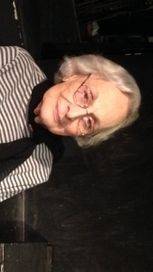Janice Rothbaum has been a fixture at the Station Theatre for as long as most of us can remember. She hasn’t appeared in every show, nor has she appeared in every season, but her presence there is palpable. She wasn’t there at the very beginning, when Rick Orr and some others were starting what we now know as the Station, but that’s because she was busy doing other things. (We’ll get to that.) And by “fixture,” I don’t just mean on stage, as Janice and her husband, Mel, have also been two of the most ardent audience members of the Station — and pretty much any other theater in the area (and beyond the area) — for decades.
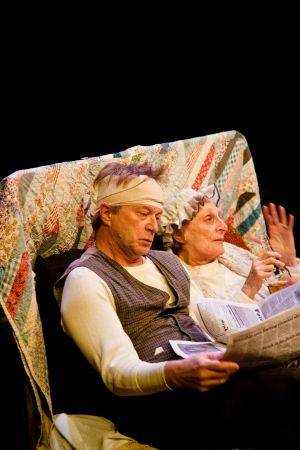 I first got to know Janice by reputation. As a newcomer to the Station, I had not yet worked with her when I got the chance to direct her in a production of Martin McDonagh’s The Cripple of Inishmaan. But her name was well known to me, and everyone had such lovely things to say.
I first got to know Janice by reputation. As a newcomer to the Station, I had not yet worked with her when I got the chance to direct her in a production of Martin McDonagh’s The Cripple of Inishmaan. But her name was well known to me, and everyone had such lovely things to say.
“She’s so great to work with,” they would say, or “She’s such a pro.”
They weren’t wrong, and yet I would find out that they weren’t even close.
When we rehearsed Cripple, it was the dead of winter. We were in the attic space of the home of the Station’s beloved friend Danny Sullivan.
All those stairs, I thought. All that ice. It’s so cold out. And Janice is, what, eighty? As it happens, she was 84 at the time, and she knew her lines before anyone else in the cast was even close.
Janice Rothbaum is a kind of soft-spoken force of nature. Funny, genuine, intimidating in the way that much more experienced people can be. It’s hard to feel, when you hear of her exploits, that you’ve done much of anything yet.
She has made quite a mark, in the last couple of decades, playing, let’s say, “mature” parts in various plays in various theaters, and she used to pull me aside now and then and tell me to remember her if ever I needed an Old Lady for one of my shows.
As she readies herself to open a new play at the Station Theatre this week, Rothbaum is, indeed, playing an old lady. But that’s just what’s on the surface. As I learned, and as audiences will discover, there is a lot more going on.
The final performance of 4000 Miles, written by Amy Herzog and directed for the Station by Sara Boland-Taylor, will take place on Rothbaum’s 90th birthday.
Let that sink in for a second.
———
Smile Politely: I do want to focus mostly on the Station Theatre for this article, but I wonder if you’ve kept track of how many shows you’ve done, in all, in this community and beyond?
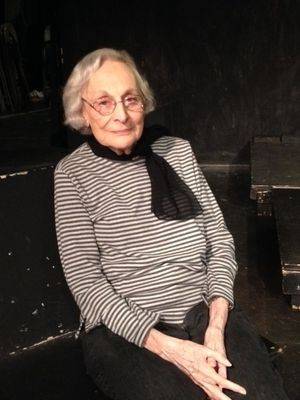 Janice Rothbaum: 4000 Miles will be my 19th play for The Station and my 40th in various venues since I resumed acting in 1989, as I was approaching retirement from my career as a clinical social worker. The first play I did in Champaign-Urbana was Tina Howe’s Painting Churches at Parkland College, which starred another newcomer, Joi Hoffsommer.
Janice Rothbaum: 4000 Miles will be my 19th play for The Station and my 40th in various venues since I resumed acting in 1989, as I was approaching retirement from my career as a clinical social worker. The first play I did in Champaign-Urbana was Tina Howe’s Painting Churches at Parkland College, which starred another newcomer, Joi Hoffsommer.
SP: And your acting has extended beyond the stage.
Rothbaum: I’ve been in a number of films and TV documentaries, as well as some commercials and industrials. I first started acting in Bennington (VT) High School, where we were fortunate to have had wonderful and devoted drama and music teachers who immersed us in everything from Shakespeare to Gilbert and Sullivan. At 5 feet, eight inches, I was one of the taller girls in my class and never got any of the ingénue or romantic leads. I specialized in maiden aunts, ladies-in-waiting, and pageantry figures like Miss Liberty, Miss Dixie, or the Christmas Angel who always began with “Verily, verily, I say unto you.” And I played the Fairy Queen in Iolanthe, which is one of the big G & S contralto parts like Katisha and Buttercup. I recall with wonder that I was a very quick study and never suffered from stage fright. (That was then. This is now.)
SP: Insert editorial laughter here.
Rothbaum: At Syracuse University I majored in radio journalism and was a fixture at the Radio Workshop, where I wrote, directed, and acted in numerous radio plays. And, as a professional radio writer and broadcaster, I did women’s and children’s programs and a flock of commercials.
SP: That’s an extraordinary body of work, even before you “came on the scene” in Champaign-Urbana. I’ve only ever known you as a stage actor, but there is so much more to the picture. What was your first production at the Station Theatre in Urbana? What do you remember of that experience?
Rothbaum: My first role at The Station was the Lady Abbess in The Comedy of Errors in 1991. It was a modest part, but I was thrilled to be working with a wonderful cast (which included Dave Butler, Carolyn Kodes, and Angela Marcum) in a very witty production. The most challenging thing for me was climbing a ladder with rungs like broom handles while wearing a long habit and petticoats, to reach a balcony that seemed none too stable to me. (I will confess to being a coward about heights.) Some kindly soul always steadied my feet as I ascended, to make sure that I didn’t trip over my skirts.
SP: I would imagine that you’ve accumulated quite a lot of “favorite moments” from the stage over the years. Are there one or two you might share?
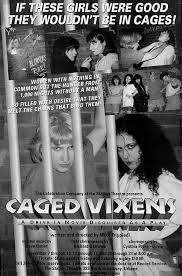 Rothbaum: I’ve had so many wonderful moments in the theater that it’s hard to single out a favorite—and I hate slighting any of the fine directors and casts I’ve been privileged to work with. But I was very proud of being part of Bob Anderson’s thrilling production of The Crucible at Krannert Center for the Performing Arts, in which I played Rebecca Nurse. And I really enjoyed being Mammy in The Cripple of Inishmaan. I got to play my first romantic lead in The Lion in Winter when I was 68 years old, and I loved that. I had a wonderful time as Moms in Mike Trippiedi’s zany Caged Vixens, in which I was featured as the oldest inmate in a women’s prison. I had recently had a mastectomy and had confided to Mike that I had reassured my son that I would be fine after the surgery, but probably wouldn’t be able to work as a topless dancer. Mike wrote the part of Moms for me as a topless dancer who had killed a sailor “who wanted to see more.”
Rothbaum: I’ve had so many wonderful moments in the theater that it’s hard to single out a favorite—and I hate slighting any of the fine directors and casts I’ve been privileged to work with. But I was very proud of being part of Bob Anderson’s thrilling production of The Crucible at Krannert Center for the Performing Arts, in which I played Rebecca Nurse. And I really enjoyed being Mammy in The Cripple of Inishmaan. I got to play my first romantic lead in The Lion in Winter when I was 68 years old, and I loved that. I had a wonderful time as Moms in Mike Trippiedi’s zany Caged Vixens, in which I was featured as the oldest inmate in a women’s prison. I had recently had a mastectomy and had confided to Mike that I had reassured my son that I would be fine after the surgery, but probably wouldn’t be able to work as a topless dancer. Mike wrote the part of Moms for me as a topless dancer who had killed a sailor “who wanted to see more.”
SP: What was the most difficult role you ever assayed? What made this character so difficult? (This could be at the Station or anywhere, really.)
Rothbaum: I think my most difficult role was that of The Old Woman in Ionesco’s The Chairs. It’s essentially a two-person play, and the dialogue is full of non-sequiturs and imaginary characters. Very hard to memorize. And it was physically demanding. I carried more than 30 chairs around the stage and wound up in the hospital before we opened because I had chest pains. These turned out not to be from a heart attack, but merely a pulled muscle, but my doc wanted me to have someone else carry the chairs for me.
SP: I’m genuinely curious about what got you into acting in the first place. What was it that drew you to the stage? What do you remember of your first experiences on stage?
Rothbaum: As I said before, I had great high school teachers. And my mother was a theatre enthusiast. Born in New York City, she still had family there, and we often stayed with them and saw a few Broadway shows during our visits. One of my mother’s brothers had been a Vaudevillian, and she herself loved to play the piano and sing. And, back in those days, all of the children in our extended family (and the neighborhood, for that matter) were expected to entertain the adults at social gatherings. Some sang or played a musical instrument. My specialty was doing imitations of Greta Garbo and Katherine Hepburn.
SP: I know you attend a lot of theatre productions. What have you seen lately that you really liked?
Rothbaum: We are really fortunate to have younger friends who ferry us to Chicago, where we all have subscriptions to Steppenwolf and both Goodman Theaters, the Albert and the Owen. Most recently we enjoyed Ask Aunt Susan at the Owen. But we didn’t like it more than The Station’s current production of Orphans!
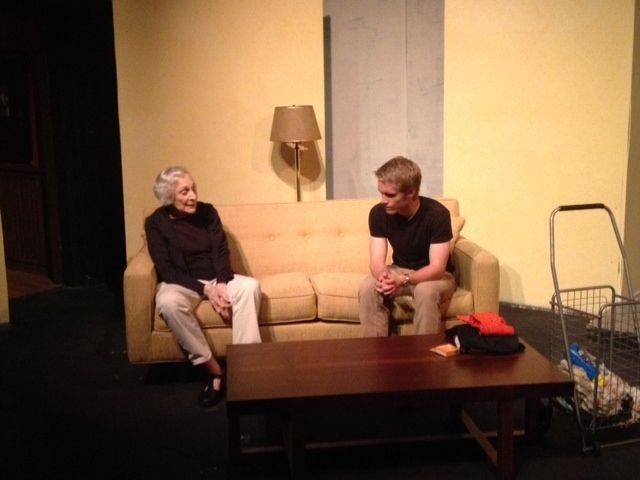
SP: One last question, and this one is specific to the current show, 4000 Miles. What do you like about your character in this play? What is it about her that you find interesting each night?
Rothbaum: Vera, the grandmother in 4000 Miles, is someone with whom I can readily identify. She’s 91, and most of her contemporaries have died. (I am luckier than she because I have many younger friends.) And names and words are harder to come by. Also I’ve known a few “lefties,” probably more Trotsky-ites than Marxists, though I myself can only qualify as a Democrat. Like Vera’s, my grandkids attended Evergreen College, a kind of a hippy paradise. (But I’m happy to say that mine made it through graduation.) I like her because she’s brave and feisty and clings to her ideals about wanting what’s best for the community, rather than personal gain. I hope that I’m more tactful than she is, but it’s fun to play someone who says what she thinks, without much regard for consequences.
———
Like I said, it’s hard to sit down with Janice Rothbaum (even if it’s just with her emails) and feel as if you’ve done much with yourself. I don’t know anyone who has seen more theatre and genuinely enjoyed the experience. Critics see everything, and they might hope, deep down in whatever hearts they claim, that what they see will be good. Janice and her husband Mel are true lovers of the work, of the storytelling, and of the experience.
Janice Rothbaum has been responsible for so many great C-U theatre experiences in a relatively short amount of time. And the richness that she has added to our creative community has been but a drop in the bucket of all that she has done.
As I sit down to write this profile, I have just read online of the passing of Elaine Stritch. Stritch was 89, and left in her wake a legend that spanned nearly all the creative arts. And, as all of the tributes to her life and work begin to surface, they will almost certainly include some reference (probably lovingly, out of respect) to her reputation for being difficult. From what I’ve read and seen, “difficult” doesn’t begin to describe Stritch. Still, though, there is her legend. Her history. Her body of work.
There are a lot of words to describe Janice Rothbaum. “Difficult” will never be one.
It does not escape my attention that Janice Rothbaum, the Station Theatre’s own grand dame (and that’s how I think of her, and how you might well, too), has just undertaken a new director and a cast of relative youngsters in a scrappy little black box theatre. And she wouldn’t have it any other way.
I got to see 4000 Miles on its first (and only) Sunday night, and I couldn’t have been more pleased by how sharp and clear Rothbaum’s presence is. She’s not just playing an “Old Lady” in the piece; as Vera, she’s playing a fully developed human being with a long history and loads of experience. Her interplay with Casey Thiel (who plays her grandson Leo) is especially fun to watch, and their moments of back-and-forth are the best in the show.
In honor of 90 years and more than 40 productions, I’ll end with a toast: Here’s to climbing the ladder, even if you think the balcony won’t be safe. May someone always have your feet.
That’s acting. That’s Theatre.








